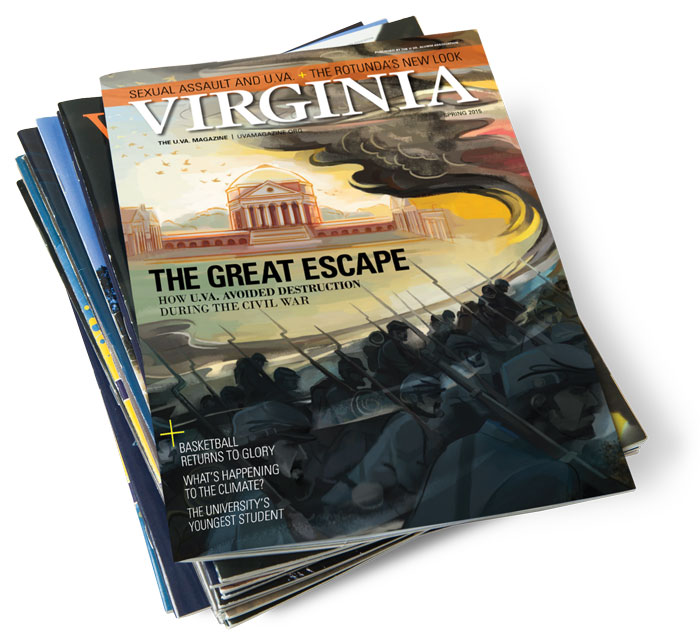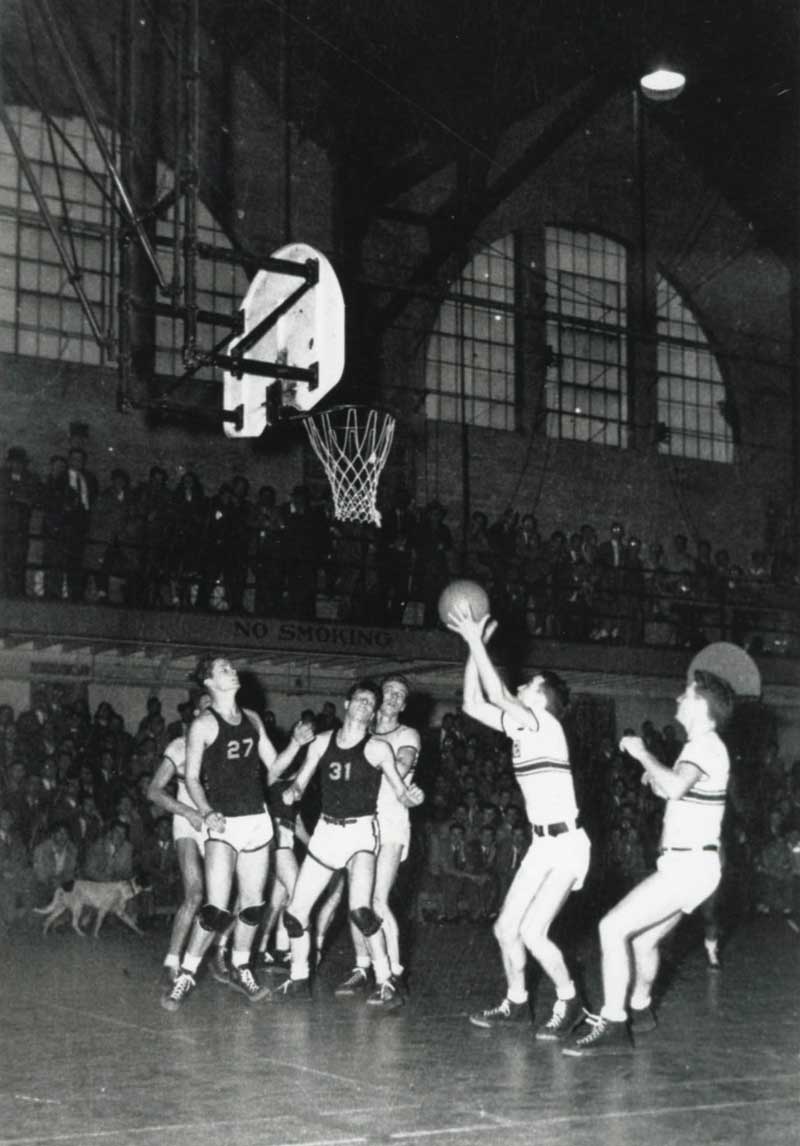Letters to the Editor
Readers share their thoughts about recent articles and events
Rolling Stone Reaction

I’ve never associated with, nor do I see the point in, college fraternities. However even I had immediate doubts about the Rolling Stone rape story. For an institution that claims to value truth and honor, the only course of action should have been to uphold the traditional American value of innocent until proven guilty and let the police investigate, bring charges, give the accused a fair trial, and punish the guilty.
The new and extreme restrictions on fraternities as well as the support of the unfounded claims showed a blatant disrespect for both the individuals involved and the values the University is supposed to represent. Thomas Jefferson must be rolling in his grave.
Now that the police have suspended the investigation for lack of evidence, it is time to rectify the misdeeds and restore the University’s good name.
Leonard T. Harris (Col ’95)
Glen Allen, Virginia
I was disappointed to read the letter of David M. Snow in which he said “the Greek system has been unjustly vilified.” Sadly, Greek systems around the country (and at UVA) are entirely the problem because the foundation of most Greek fraternities, in particular, from pledge week to graduation, is based on underage (that means illegal) consumption of alcohol, not by the glass but by the keg.
Let’s start by enforcing the existing misdemeanor laws in Virginia against underage drinking with $2,500 fines/60 days jail time, and the incidents of sexual assault on campus will surely decline. Imagine how safe life would be on campus if only 21-year-old fourth-year and graduate students consumed alcohol.
Karl Wilson (Col ’93)
Salt Lake City, Utah
History Lessons
I look forward to receiving and devouring the alumni magazine. Typically, I head first to obits and class notes, then letters and on to a leisurely reading of stories of student, graduate and faculty research and other pursuits.

Being a history major and Civil War buff, I headed straight to the story in the Spring 2015 issue of Custer’s (and Sheridan’s) sparing of the University and Charlottesville—lucky for the town, as Sheridan was not known for grace and forbearance during the ragged last days of the Confederacy, having laid waste to more than one stretch of the Old Dominion.
One of life’s pleasures, and a rationale for hoarding printed material, is to reread or peruse a magazine or brochure and discover something you may have skipped or skimmed earlier. So it was for me, after thumbing through and reading much of the spring issue, that the story about Lauranett Lee’s research caught my eye. What a wonderful story! And what an important project, despite its obvious heartache. I salute her and writer Matthew DeWald for this report.
Tom Ayres (Col ’68)
New Albany, Ohio
The whole tone of the article “A Civil Occupation” seems wrong. In what way should we today consider the Union victory “bad news?” The only people who should feel that way today are the people who “lament” slaves going free.
In what way was the occupation “traumatizing” and “horror and rage” inducing to the locals? Only because of the freeing of their euphemistically named “servants.”
I am happy the town and the University did not burn. But as the racially segregated product of hypocritical slave-owning Jefferson and populated by slave-owning professors like Minor who was sorry for the “poor misguided creatures” going free, you can kind of feel the residents’ surprise that it was not leveled.
March 2 should probably be celebrated today on Grounds as liberation day.
Rob Harris (Com ’79)
New York, New York
My husband and I have a daughter from the class of 2010. We still visit UVA once or twice a year, and as we meander along the pathways of the Academical Village we cannot help but wonder and imagine about the many slaves who built this gem of a university. Who were they and what were their stories? Thank you, Lauranett Lee! I look forward to receiving updates on this extremely valuable project.
Laura Johnson
Pelham, New York
Changing Climate

I am writing with respect to the article “A World of Change” in the Spring 2015 edition. While I appreciated the update on the research of several colleagues in the department of environmental sciences (where I was a faculty member for more than seven years in the 1970s and early 1980s), the article perpetuates the incorrect view that “subtle warming has set off changes in every part of the globe.” In reality, the response of the climate to human forces (which is much more than that from added carbon dioxide and from the reported increase in global average temperature) is much more complex than the article presents.
The bottom-line message is that while we are affecting the climate, the response in our weather and other aspects of the climate system is more diverse, less predictable and often in a direction that was not anticipated. Controlling the emissions of CO2 into the atmosphere is only one part of a much bigger environmental and social issue.
Roger A. Pielke Sr.
Longmont, Colorado
Reading and Knowledge
I take issue with the views of DMM Simonton of Fayette, Mississippi, expressed in the formula “knowledge is necessary to be able to read, reading to think critically, and both are preparatory to writing well” (Letters, Spring 2015).
I would revise it thus: Reading is necessary for knowledge, knowledge to think critically, and both are necessary for writing well.
Zell Rosenfelt
Falls Church, Virginia
Mem Memories

I enjoyed the short article “When Mem Rocked.” Mem Gym had two rooms off the track that were used by Jim West to assist students who needed some help with living costs. He used the rooms to house several of his baseball players and I was fortunate to live in one of them during the 1966-67 school year. One major event that I recall from living there is watching from the track overlooking the gym floor as James Brown, “The Godfather of Soul,” performed.
Charlie Hart (Engr ’67)
Topping, Virginia
Weird and Wonderful
Hopefully not sounding trite, I am an avid reader of the UVA Magazine, particularly the arts and sports sections. The Spring 2015 issue was like a whiff of invigorating fresh air after a long, frigid winter laced with many negative potshots at UVA. Thankfully, we had Coach Tony Bennett’s stellar team to help keep our spirits high.
I am moved to say that two articles in the current issue—“Weird Is Wonderful” and “Sadness Like Moonshine”—piqued the mystical and occult strains of my personal being. Permit me to explain.
I know that indeed weird is wonderful because I have been labeled as such from childhood. I early became intrigued with the mysterious and magical and by my early teens was busy entertaining audiences semiprofessionally. Yes, weird but true!
Subsequently, as I grew older I became interested in journalism, the ministry and teaching—in that order. Now long retired, I am glad to have enjoyed success in all these fields.

Relevant to “Sadness Like Moonshine,” as I advanced in the teaching part of my career through courses at the Curry School of Education simultaneously with full-time teaching at Fork Union Military Academy, I had many opportunities to know other educators. As chair of the English department at F.U.M.A., I mentored younger English teachers.
The occasion of meeting Breece D’J Pancake, who had just become a member of the F.U.M.A. faculty, I now consider one of the most memorable experiences of my teaching career. At once, I knew that this tall, reserved, well-spoken young man with soulful, piercing eyes was well acquainted with many of life’s mysterious, maybe exasperating and bleak circumstances. In retrospect, I realize that was indeed the fountainhead of Pancake’s remarkably soul-searching, expressionistic and humanistic writing.
No wonder Breece D’J Pancake’s evocative works are seeing a revival in our troubled times. I shall never understand why such a gifted young writer decided to take his own life, but I pray that he finally did find his “own ghost” up one of those Appalachian hollows and can now rest in peace—and just maybe he can still help many to deal with their own ghosts.
Robert K. Spencer (Educ ’68)
Scottsville, Virginia